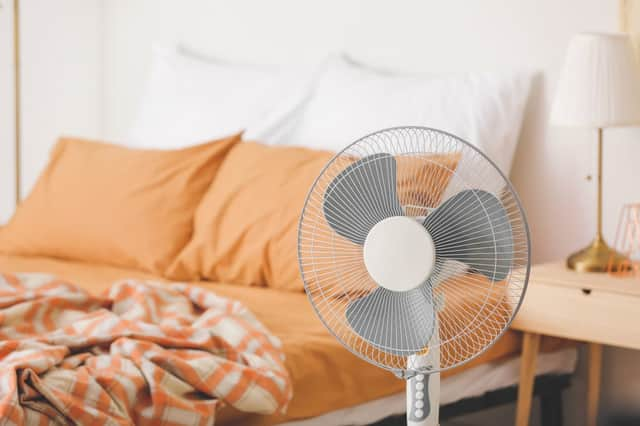This is how much it costs to keep a fan running all night - and if it’s safe to do so
This article contains affiliate links. We may earn a small commission on items purchased through this article, but that does not affect our editorial judgement.


With temperatures across the UK climbing higher and higher, many of us are struggling to cope with the heat.
When the country starts heating up, lots of us reach for the fan that’s kept in the cupboard for most of the year.
Advertisement
Advertisement
But is keeping a fan running all the time safe? And how much is it adding to your electricity bill?
How much does it cost to use a fan?
All energy is measured in watts (W) and kilowatts (kW).
Once you know the number of watts or kilowatts your appliance uses, you’ll be able to figure out how much the energy is costing you per use.
There are ways to calculate the cost of running your appliance yourself, but there are also websites that will calculate the energy and cost, such as Sust-it.
You can enter the energy tariff you’re on to get a more accurate calculation, otherwise you can use the calculations based on the UK average from December 2019.
Advertisement
Advertisement
You’ll be able to figure out the wattage of your fan from the product booklet or the website that you bought it from. The bigger the fan, the higher the wattage it will likely use.
For example, if you bought this 12 inch oscillating desk fan from Argos, the product description states that it uses 30 watts of energy.
The average person needs eight hours of sleep, so if you were to leave the fan running all night for eight hours, according to Sust-it, that will cost you 4.45p in electricity.
If you were doing this every night over the course of the week, it would add up to 31.15p per week.
Advertisement
Advertisement
Alternatively, if you had opted for a larger fan, like this Dyson tower fan from Currys PC World, which uses significantly more energy at 2000 watts, it would cost you £2.97 per night.
Again, if you were doing this every night over the course of the week, this would add up to £20.76 in electricity.
Is it safe to leave a fan on all night?
Electrical Safety First (ESF) says that it has “noticed a number of incidents involving electric fans popping up in the news - many people aren’t aware that these cooling devices can actually get a little too hot”.
To avoid fires started by fans, ESF states that you shouldn’t leave your fan running overnight or whilst you’re out of the house.
Advertisement
Advertisement
As well as posing a potential fire risk, leaving a fan running all night could pose some health risks as well.
In a document published by Public Health England with tips and tricks for beating the heat during coronavirus, it states that fans “can cause excess dehydration” so they should not be aimed directly at the body.
The rapid air movement caused by a fan can dry out your mouth and nasal passages, your eyes and can even cause dry skin conditions, according to Mark Reddick from Sleep Advisor.
Reddick says: “As a fan moves air around the room, it causes flurries of dust and pollen to make their way into your sinuses.
Advertisement
Advertisement
“If you’re prone to allergies, asthma, and hay fever, this could stir up a whole lot of trouble.”
Other ways of keeping cool
For those looking for more ways to beat the heat in the summer, the NHS has compiled a list of tips to help you cope in the hot weather:
- While it may be going against your instincts, the NHS says to shut the windows and pull down the shades when it’s hotter outside. Using light-coloured curtains is best as dark curtains can make the room hotter
- Have cool baths and showers
- Drink plenty of fluids and avoid alcohol
- Wear loose, cool clothing
- Thin cotton sheets rather than nylon bedding is recommended for keeping cool whilst you sleep